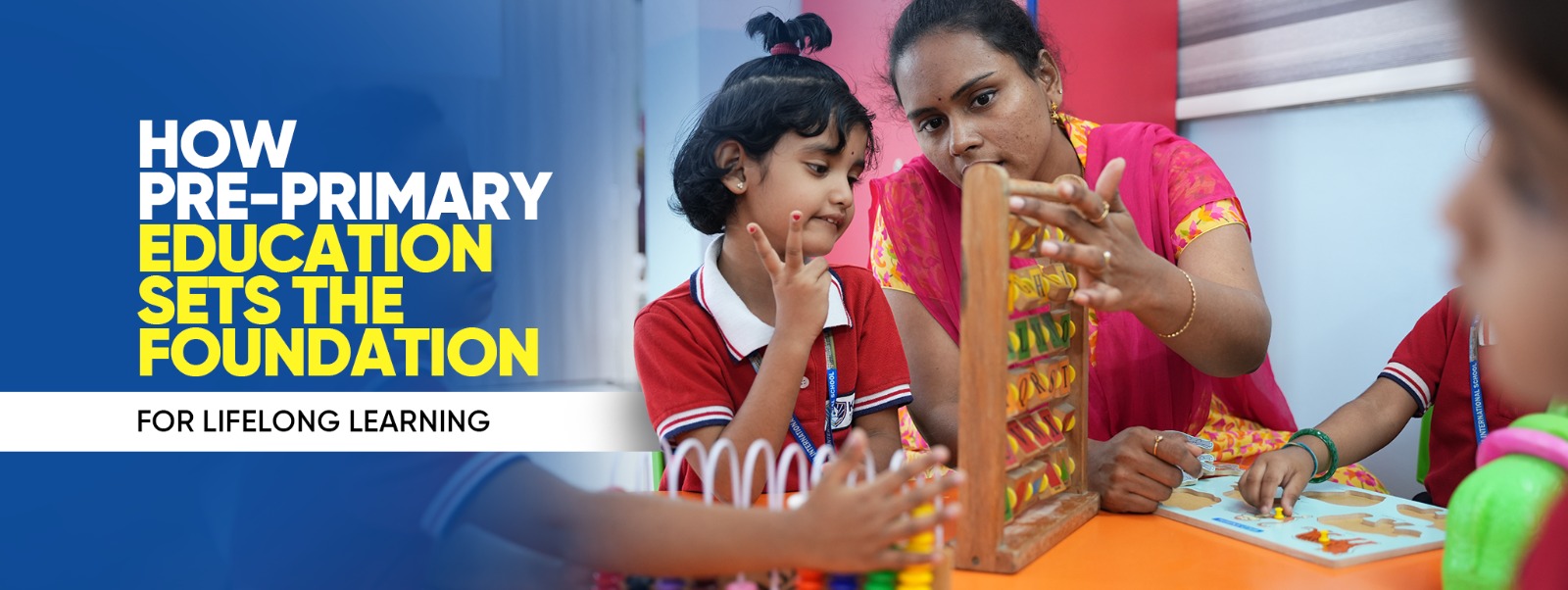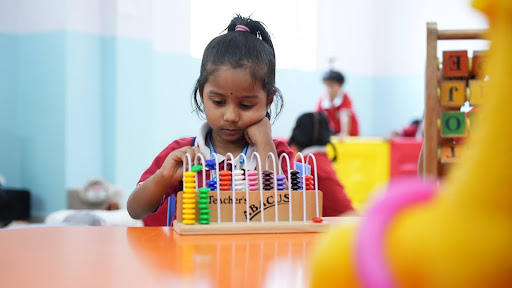
How Pre-Primary Education Sets The Foundation For Lifelong Learning
For a child’s general growth, the formative years are essential. Preschool, often known as early childhood education or pre-primary education, involves much more than only a start to structured learning. It serves as the starting point for a child’s path of lifetime learning. Children have many possibilities to develop cognitively, socially, emotionally, and physically throughout these critical years. Let’s examine how a child’s future is significantly shaped by their pre-primary schooling.

1. Cognitive Development
A child’s brain during the pre-primary years takes up knowledge from everything they see. In the structured setting of a pre-primary school, young learners are exposed to fundamental ideas in reading, math, and problem-solving.Activities like :
- Reading and Storytelling: Develop your vocabulary and understanding.
- Building blocks and puzzles: Foster spatial awareness and critical thinking.
- Easy Science Experiments: Encourage interest and a comprehension of cause and effect.
These activities cultivate a love of learning and promote intellectual growth, which lays the foundation for future academic achievement.
2. Social Skills Development
Pre-primary school is sometimes a child’s first opportunityto socialise with classmates from outside the home. They gain vital social skills in this setting, including :
- Taking turns and sharing .
- paying attention and doing as directed.
- Settling disputes and working together in teams.
Children gain empathy, patience, and collaboration via group activities like playtime, art projects, and school games—skills that are essential for forming connections throughout their lives.
3. Emotional Growth and Resilience
Children can freely express themselves in a secure and supportive setting throughout pre-primary school. Children need their teacher’s and caregivers support to understand and manage their emotions. For example :
- Positive Reinforcement: Increases self-assurance and a feeling of accomplishment.
- Role-Playing Activities: Teach youngsters how to handle diverse circumstances, including making new friends or dealing with disappointment.
- Encouragement to Try New Things: Makes kids more resilient and adaptive.
These experiences help people become more emotionally mature, which is necessary for handling the difficulties of life.
4. Language and Communication Skills
One of the main goals of pre-primary education is language development. Children gain excellent self-expression skillsthrough dialogue, music, rhymes, and storytelling. Activities like:
- Encourage kids to speak confidently in front of others through show-and-tell activities.
- Interactive Storytime: Aids with vocabulary growth and comprehension of sentence structure.
- Group Discussions: Instruct students in the art of talking and listening.
Effective communication, which is essential in both personal and professional spheres, is built on these abilities.
5. Physical Development
Activities in pre-primary schoolsfoster both fine and gross motor abilities. Among the examples are :
- Playing outside: Exercises like running, leaping, and climbing enhance coordination and physical health.
- Art & Craft: Practices such as cutting, pasting, and sketching improve dexterity and hand-eye coordination.
- Music and Movement: Games focused on rhythm and dancing help players improve their agility and balance.
Children who engage in physical activitynot only maintain their health but also become ready for school-related skillslike writing.
6. Instilling Good Habits and Discipline
Children are exposed to a regular schedule during pre-primary school, which aids in their understanding of the value of discipline and time management. Basic procedures such as :
- Observing a daily routine.
- Tidying up after events.
- Quietly awaiting their time.
These habits help kids be responsible and do well in school and life.
7. Fostering Creativity and Imagination
Pre-primary schooling offers the ideal setting for fostering children’s innate creativity and curiosity. Such as :
- Role-playing games give kids the chance to experiment with various viewpoints and situations.
- Art Projects: Promote creativity and self-expression.
- Free Play: Allows people to create their own tales and games.
These kinds of experiences foster creative thinking and problem-solving abilities in kids, which are critical for success in any area.
8. Encouraged Independence
Children are frequently taught to make basic decisions in pre-primary settings, such as choosing their activities or taking care of their possessions. Their confidence is increased and a sense of independence is fostered. For example :
- Making a decision involves deciding between painting and constructing blocks.
- Taking care of their own backpack or food box teaches them responsibility.
These small actions have a significant impact on children’s development into independent adults.
9. Building a Love for Learning
The goal of pre-primary education is to make learning fun. Children’s attitudes towards learning are improved when play and instructional activities are combined. For instance :
- Math becomes enjoyable and interesting when numbers are learnt via songs.
- Nature Walks: In an engaging manner, teach kids about flora and animals.
- Cooking Activities: Explain measures and fundamental science.
Children are more inclined to seek information throughout their lives when they see studying as enjoyable.
10. Parental Involvement
Collaboration between parents and teachers is frequently emphasised in pre-primary education. Frequent contact gives parents advice on how to enhance learning at home and keeps them updated on their child’s progress. This collaboration ensures regularity and supports children’s development.
Final Thoughts
Pre-primary education is not just a phase that prepares children for formal schooling; it is the foundation of their lifelong learning and development. It gives kids the abilities, routines, and attitude they need to thrive both academically and personally by emphasising holistic development. Pre-primary education is an investment in their future, as these early experiences mould them into the people they are today.
Start Your Child’s Journey at Kiran International School, Boduppal, Hyderabad
We recognise the value of early childhood educationat Kiran International School. The goal of our pre-primary programis to give your child a safe, engaging environment in which they may develop, learn, and flourish. We set the stage for your child’s success for the rest of their life with our skilled teachers, cutting-edge facilities, and emphasis on holistic development.
Visit us today at Boduppal, Hyderabad, to see how we can shape your child’s educational journey. To learn more, get in touch with our admissions team!





